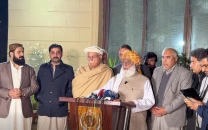NAB seeks access to tax record of politicians
Bureau recommends 4 amendments in Income Tax Ordinance through Finance Bill 2021

In a major development, the National Accountability Bureau has asked the government to give it access to local and offshore tax records of all politically exposed persons, bureaucrats and their families by introducing new legal amendments before approval of the budget.
The bureau has recommended four major amendments in the Income Tax Ordinance 2001 through the Finance Bill 2021, which the National Assembly is expected to approve next week on Tuesday. These proposals, if accepted by the government, will allow NAB to even reopen the past and closed transactions of the last 20 years, official documents showed.
The “request” for bringing these amendments in the Income Tax Ordinance with effect from the year 2001 is made at a time when the bureaucracy has already been complaining about overdoing by NAB. The opposition parties too have lodged protests over what they call “witch-hunting” by NAB.
NAB has asked to end immunity in sharing of local and offshore tax records of politically exposed persons including the members of parliament, bureaucracy, public servants and people in service of Pakistan, the holders of public office and their spouses and children, the documents showed.
The sources said that the government’s top tier was reviewing NAB’s request and the decision will be taken by Prime Minister Imran Khan.
“The secretary law has forwarded NAB’s request to the finance ministry and they have to take a decision whether to accept these proposals or not,” Law Minister Barrister Farogh Naseem told The Express Tribune.
“The government believes in transparency and rule of law and to stop wrongdoings by public office holders and politically exposed persons … there is a need to end layers of secrecy,” Barrister Naseem said.
Read: Tarin defends 'budget of hope' in concluding NA session
NAB seeks to relax Section 216 of the Income Tax Ordinance, which ensures confidentiality of taxpayers’ data. The bureau has stated that India has ended confidentiality in 1964 by omitting Clause 137 in its law, which is equivalent to Pakistan’s Section 216.
However, under Section 138, the Indian government still has the authority to keep any information confidential.
NAB also seeks access to tax data being shared by other countries under avoidance of double taxation treaties and the Organization for Economic Cooperation and Development (OECD) by amending Section 107 of the income tax law. Any change in this section may create serious troubles for the government, as the country is bound to keep offshore data confidential under the international conventions, the sources said.
The proposal is pushed to be included in the amended Finance Bill 2021, which Finance Minister Shaukat Tarin is expected to introduce in the National Assembly on Monday (tomorrow). As a practice, any tax matter-related changes that the government wishes to bring after introduction of the budget are then brought through the finance bill.
One of the reasons for delaying the amended finance bill is the government’s indecisiveness about NAB’s proposals, the sources said.
Federal Board of Revenue Chairman Asim Ahmed was not available for comments.
NAB has sought that sections 107, 182, 198 and 216 of the Income Tax Ordinance “be suitably amended so that immunity available to exposed persons including the members of parliament, bureaucracy, public servants and people in service of Pakistan, public office holders and their spouses and children may be done away with”.
In its official correspondence, NAB argued that Section 19 of the National Accountability Ordinance empowers NAB authorities to seek information for the purpose of evaluating as to whether there has been any contravention of the provisions of NAB Ordinance or not.
“An anomaly exists in the provisions contained in Section 216 of the Income Tax Ordinance, 2001 which restricts disclosure. This position gets further complicated where the person against whom information is sought is himself or herself not a public servant but a close relative of a public servant, thus, this office feels that sections 107 and 216 of the Income Tax Ordinance 2001 undermine the provisions of Section 19 of the NAO 1999”.
NAB said that if there was any complication in respect of amendment in sections of 107 and 2016 of the Income Tax Ordinance with regard to politically exposed persons from the stand point of discrimination in terms of Article 25 of the Constitution, perhaps an uncontentious method of dealing with matter would be to omit Section 198 with retroactive effect, covering vested rights and past and closed transactions as well.
The bureau stated that the retroactivity was necessary so that the omission clearly lifts the immunity for events or actions that may have already taken place so that NAB may inquire or investigate them.
“We are proposing that at least the following amendments may be taken up in the Income Tax Ordinance 2001, in the coming Finance Act,” according to NAB documents.
“In the Income Tax Ordinance 2001, the following further amendments shall be made which shall always deem to be in force since inception of the ordinance and shall take effect from the first day of July 2021, and shall have operation despite any vested right or rights as a past and closed transaction that may have been acquired.”
NAB believes that the access to taxpayers' records was necessary to “end corrupt practices”.
A senior government functionary said that the Punjab Anti-Corruption Department was also facing similar problems in its probe in the Rawalpindi Ring Road project. The Punjab department has also sought similar relaxations.
Read more: Ministers say budget approved, thanks to the opposition
What are these sections?
Section 107 deals with agreements for the avoidance of double taxation and prevention of fiscal evasion. One of its clauses says, “Any information received or supplied, and any concomitant communication or correspondence made, under a tax treaty, a tax information exchange agreement, a multilateral convention, a similar arrangement or mechanism, shall be confidential.”
Section 216 says, “All particulars contained in any statement made, return furnished, or accounts or documents produced under the provisions of this ordinance; any evidence given, or affidavit or deposition made, or any record of any assessment proceedings or any proceeding relating to the recovery of a demand shall be confidential and no public servant save as provided in this ordinance may disclose any such particulars.”
Section 198 says, “A person who discloses any particulars in contravention of Section 107 or Section 216 shall commit an offence punishable on conviction with a fine of not less than Rs500,000 or imprisonment for a term not exceeding one year, or both.” NAB wants to get this section deleted.
Section 182’s serial number 14 is also related to penalties on disclosure of confidential information.
NAB version
“Today is a holiday. The response will be communicated after checking official records during office hours in due course of time,” Nawazish Ali, spokesperson of NAB, replied on Saturday morning.



















COMMENTS
Comments are moderated and generally will be posted if they are on-topic and not abusive.
For more information, please see our Comments FAQ